Steven Brubaker, a cellist in the Tucson Symphony, went missing more than four months ago. He disappeared without his car or his phone, leaving his beloved cat behind. His family were frantic with worry. An extensive police search yielded no clues.
Today, we can report that Steven is back home, safe and sound.
Here’s a message from his siblings.

Dear Colleagues and Friends,
In late May we posted on Facebook and other media outlets that our brother Steven Brubaker, a cellist with the Tucson Symphony Orchestra, was missing. Many of you have reached out to share your concerns, best wishes and prayers for Steven. We are touched by the outpouring of support that so many friends and colleagues have shared, and we are deeply grateful.
We are relieved and thankful to pass on the news that Steven has been found and that he is alive. Steven has spent the last few days with family, and is now seeking medical treatment that we hope will lead him back to a healthy and peaceful life.
Like many of you, we have questions about the circumstances that led to Steve’s sudden disappearance. It will take some time to process the information we have about his last few months.
We wanted to let you all know this good news, and to thank you for your concern for Steven and our family.
Catherine Brubaker
Marina Brubaker
David Brubaker
Carol Brubaker
The French performers union (SFA-CGT) has complained to the government that local talent is being unfairly discarded. It says opera houses hire foreign singers on whom they pay no social taxes.
The Opéra de Paris is accused of casting only 3.7% of lead roles this season with singers who pay tax in France.
The ministry of culture has set up an inquiry.
Full story here.

First the Bavarian State Opera announced, with great jubilation, that it had secured the services of music director Kirill Petrenko until August 2021.
Then the Berlin Philharmonic, where Petrenko was supposed to be taking over from Simon Rattle in 2017, issued a schedule that showed its new chief conductor would be giving a ‘reduced number of concerts‘ until 2019/2020. It went on to thank the Munich opera company for its kind cooperation in releasing Petrenko for those few dates.
Finally, the Bavarian State Orchestra posted a picture of Petrenko with an exclamatory ‘Yeah!’
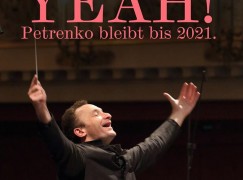
This is not the way it used to be, Berlin bending the knee to Bavaria, grateful for being allowed a corner of its conductor’s cloak. Herr von Karajan would not have been amused.
From the LA Times:
Eloisa Maturén, the wife of conductor Gustavo Dudamel, will star in a Los Angeles stage production of the popular Spanish play “Ay Carmela!” that will feature music by her husband and sets by architect Frank Gehry.
Divorce announcement here.
Full story here.

The shortlist:
1 Vladimir Jurowski, artistic director of Svetlanov State Orchestra for his War and Peace series, regarded as an anti-war statement.
2 Philip Glass Satyagraha, at the Ekaterinburg State Academic Opera and Ballet Theatre, a repertoire breakthrough.
3 Perm State Academic Opera chorus (choirmaster – Vitaly Polonsky) for outstanding artistic quality.
4 ‘Homecoming’ festival of chamber music.
5 Dr Polina Weidmann of the Tchaikovsky Museum for her work on the complete Tchaikovsky edition.
6 Timothy Kulyabin’s controversial Tannhäuser production at Novosibirsk State Academic Opera and Ballet Theatre which caused the government to sack the theatre’s directors.

The winner will be announced on October 19.
Source: ClassicalMusicNews.ru

Says it all. See here.
The 6th International Lovro von Matacic conducting competition in Zagreb ended last night with a Romanian, Gabriel Bebeselea, as winner and second prize split between a Japanese, So Awatsuji, and an American Dean Whiteside, a protege of the late Lorin Maazel.
So Awatsuji caused a bit of a stir by announcing in the televised interview that he was a student of the British jury member, Colin Metters, and thanking him.
An unexpected candour, in the circumstances.
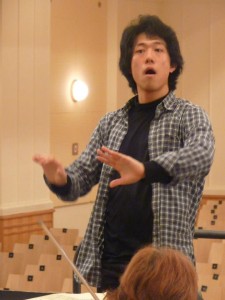
The jury consisted of: Nikša Bareza (chair), Vladimir Kranjčević, Sreten Krstić, Colin Metters, Frano Parać, Thomas Sanderling and Dian Tchobanov.
Within an hour of hearing their new chief conductor had signed on until 2021 in Munich, the Berlin Philharmonic rushed out the following statement:
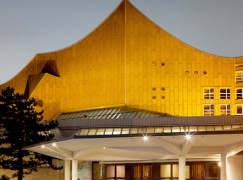
Kirill Petrenko beginnt mit der Saison 2019/2020 seine Amtszeit als Chefdirigent der Berliner Philharmoniker
Kirill Petrenko wird mit der Saison 2019/2020 sein Amt als Chefdirigent und Künstlerischer Leiter der Berliner Philharmoniker antreten.
Bereits in den Saisons 2016/2017 sowie 2017/2018 wird Kirill Petrenko bei den Berliner Philharmonikern als Gastdirigent präsent sein, 2018/2019 wird er mehrere Konzertprogramme sowohl in Berlin als auch auf Tournee dirigieren.
Mit Rücksicht auf seine Verpflichtungen an der Bayerischen Staatsoper in München wird Kirill Petrenko in seiner ersten Saison als Chefdirigent in Berlin zunächst eine verringerte Anzahl von Konzerten übernehmen.
Ulrich Knörzer, Mitglied des Orchestervorstands: „Die Wahl Kirill Petrenkos als Nachfolger von Sir Simon Rattle hat in der Musikwelt ein überwältigendes Echo gefunden. Deshalb freut es uns sehr, dass wir nun einen Zeitplan zur Amtsübernahme haben und dass wir dem Berliner Publikum unseren künftigen Chefdirigenten in allen kommenden Spielzeiten präsentieren können.“
Martin Hoffmann, Intendant der Stiftung Berliner Philharmoniker: „Wir alle bei der Stiftung Berliner Philharmoniker freuen uns auf Kirill Petrenko. Ein besonderer Dank gilt der Leitung der Bayerischen Staatsoper, mit der wir in allen terminlichen Fragen ein kollegiales Einvernehmen gefunden haben.“
Roughly speaking:
Kirill Petrenko begins in season 2019/2020 his tenure as Chief Conductor of the Berliner Philharmoniker
In seasons 2016/2017 and 2017/2018, he will present several programmes as a guest conductor, in Berlin and on tour.
In view of his obligations to the Bavarian State Opera in Munich Kirill Petrenko will, in his first season as principal conductor in Berlin, undertake a reduced number of concerts.
Ulrich Knörzer, a member of the orchestra board said: ‘The choice of Kirill Petrenko as successor to Sir Simon Rattle has received an overwhelming response in the music world. Therefore, we are very pleased that we now have a timetable for the inauguration, and that we can present our future chief conductor in all coming seasons. “
Martin Hoffmann, head of the Berlin Philharmonic Foundation, said: ‘All of us look forward to (working with) Kirill Petrenko. Special thanks to the management of the Bavarian State Opera for their collegial consultation on all scheduling issues.’
Danny Cohen, director of BBC television and the brightest spark in its upper echelons, has shocked the Corp by deciding to quit, saying he needed ‘new challenges’. Cohen, 41, was widely expected to succeed Tony Hall as D-G.
A fervent loyalist to the BBC cause, he blotted his record by rallying stars to support the Corp against Government attacks. He will depart next month, leaving the BBC much weakened at the top.
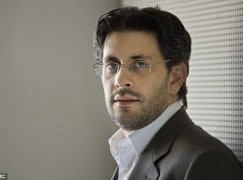
Last week, the BBC’s high-profile economics editor Robert Peston quit to join ITV.
It was always to be expected that Kirill Petrenko, the outside candidate, would not play entirely by their rules when the Berlin Philharmonic asked him to be their chief conductor.
Today, he renewed his contract as music director with the Bavarian State Opera until August 2021.
In a conciliatory gesture to Berlin, he will be known in 20/21 as guest conductor, not music director – albeit without diminishing his input.
Nikolaus Bachler also renewed today as general manager of Bavarian State Opera.
He said: ‘Kirill Petrenko and I agreed months ago to continue our work at Bayerische Staatsoper for another three seasons. We still have many ideas and joint projects that we look forward to in this very unique opera house with all its staff.
Kirill Petrenko said: ‘I feel very dedicated to Bayerische Staatsoper, to the Staatsorchester and not least of all to Munich’s wonderful public. For me, personally, it is important to work on a small, joint era in this house and with this orchestra.’
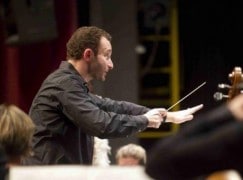
UPDATE: Berlin Philharmonic reaction here.
The German Culture Minister Monika Grütters has proposed a law that will prohibit the export of cultural artefacts valued at more than €150,000 ($165,900) and older than 50 years without a special government license.
The law is furiously opposed by the German fine-art market, which faces wipeout. We’re seeking clarification as to whether it will – as it appears – also include valuable musical instruments.
You don’t get much in the way of pedigree violins for €150,000. Many German musicians will be unable to sell their pedigree Italian or French instruments abroad.

Following the dubious results of the Joseph Joachim Competition in Hannover and similar recent outcomes, a Russian musician asks, in this exclusive Slipped Disc contribution, whether competitions might have destroyed a generation of violin talent. Since English is not Marina’s first language, please excuse the infelicities. The sentiments, however, are valid.
WHERE ARE ALL OUR VIOLINISTS?
by Marina Evreison Arshinova

Can you name a really great violinist born after 1980? Perhaps Julia Fisher. Who else?
And when did you last attend a violin recital?
The last generation of great violinists are slowly withdrawing from the big concert stage. Some have begun to conduct (Maxim Vengerov, Joshua Bell, Nikolay Znaider).
The life of violinists is relatively short: from 16 to 45, then quality of playing inevitably descends. Although David Oistrakh played at 70 more than somewhat well, but that is not typical. So, where are the extremely talented prodigies? Young flourishing talents? It seems like we face a lost generation.
Why has this happened, and who is responsible?
My answer: competition selections of the last decades. Why does this selection work more or less smoothly among pianists or singers and at the same time almost killed violin playing? The weakest fruit drops earliest to the ground. Also the chain is no stronger than its weakest link.
The responsibility lies with those who make the decisions. The great teachers one sees on juries used to give to the world as much as they consumed. Today this balance is disturbed: they consume more.
Without exaggeration, they have jeopardized the very future of violin playing.
Look at the lists of laureates of the last decades. Is there a name for whom you would spend money on a concert ticket? If so, tell me who. But how can I know you are not somehow related to this violinist?
That’s how badly the system has been corrupted.












